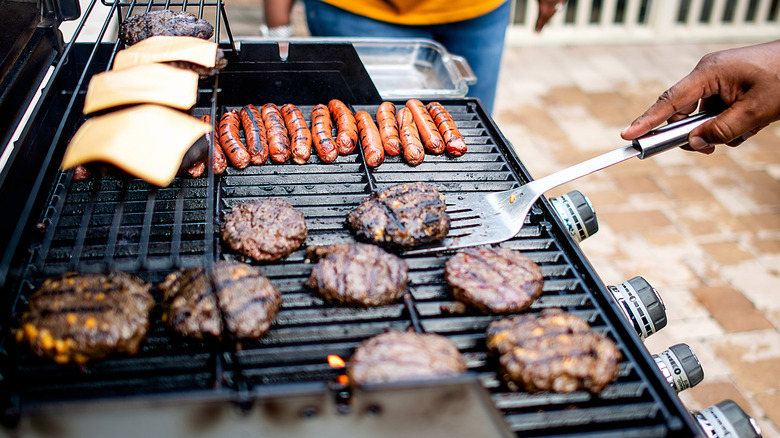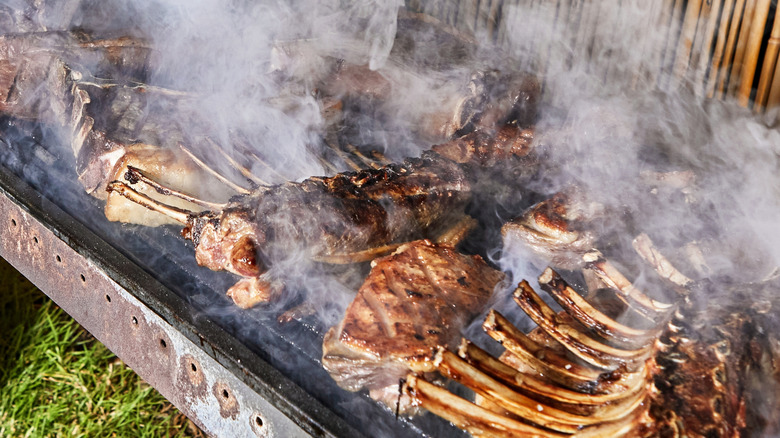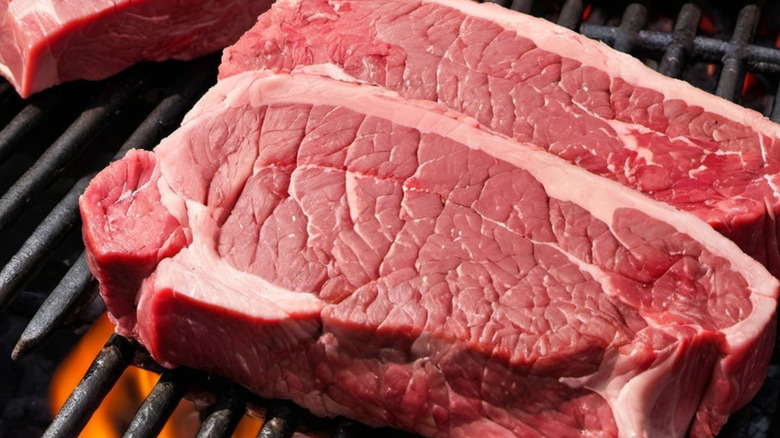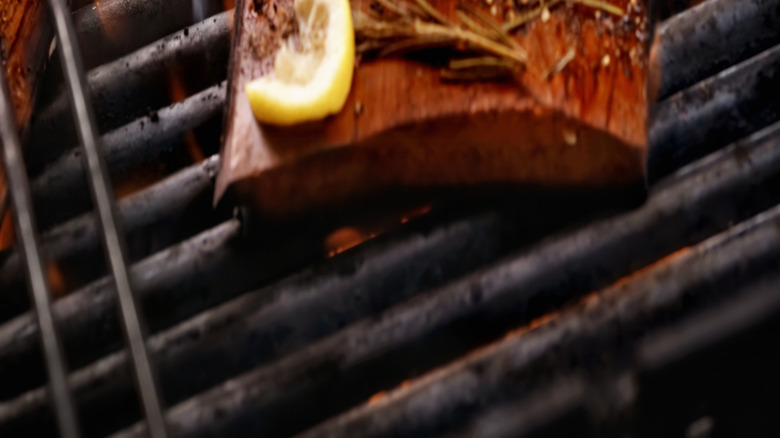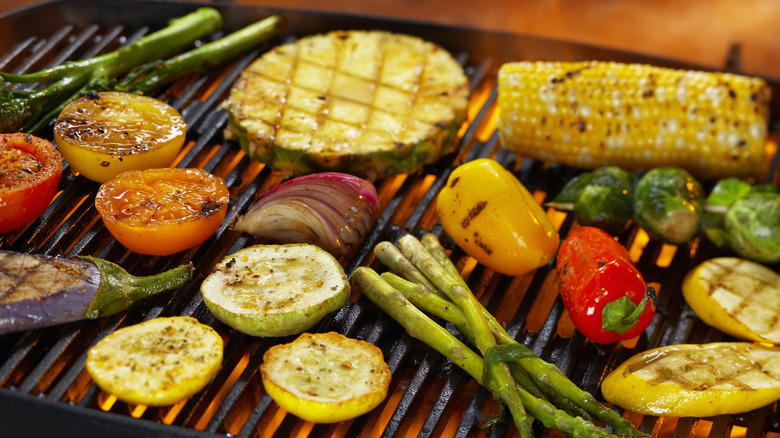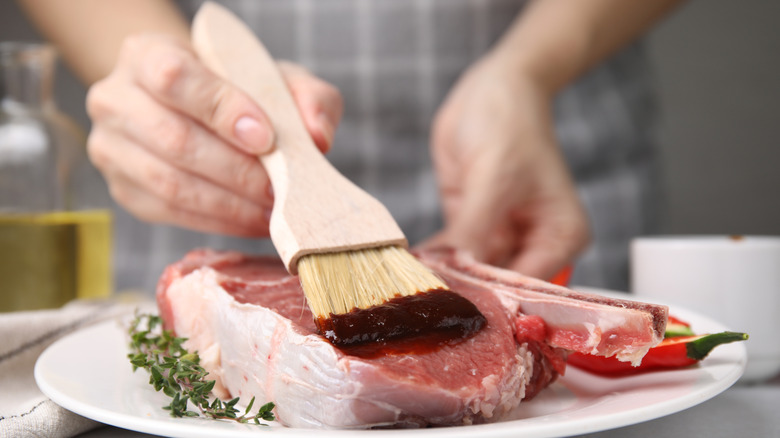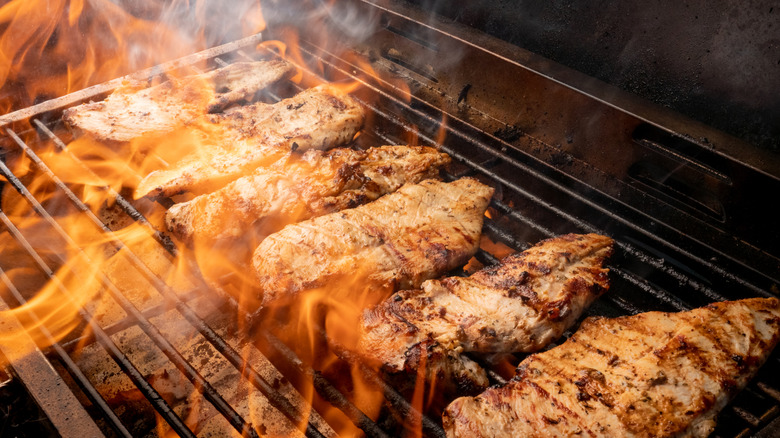Pitfalls, Problems, And Potential Health Risks To Keep In Mind When Grilling
Firing up the grill is a regular pastime for many. Not only is it fun to be the boss of the grill, but grilling is known as a healthy alternative to other cooking methods like deep frying. "Grilling can be a healthier cooking method as it requires less oil and allows fats to drip away from the food," said Dr. Chris Mohr, Fitness and Nutrition Advisor at Fortune Recommends Health.
While the grill may be the preferred cooking method for many foods, there are some items that are less desirable when grilled. Akanksha Kulkarni, RDN at Prowise Healthcare, said that grilling "encourages the cook to remove the excess fat from the food being prepared, which as a result leads to reduced fat intake. Grilled dishes made of lean cuts and veggies still pack most of their nutritional benefits, and they are also lower in calories than when fried or pan-fried." But not everyone reaches for vegetables when they're planning to grill.
Your cooking method, foods you choose to grill, and marinade choices can have significant effects on your health. Chefs and health experts have weighed in on some pitfalls and mistakes when it comes to grilling, including health risks related to flare-ups, meats you'll want to try selectively (and those you could reach for instead), and tips to help you make well-cooked, reasonably healthy food on the grill. Here's what experts want you to know before your next cookout.
Charring meat and cancer risks
Hot dogs, sausages, or burgers are popular grilling items, but experts say the health risks of eating too much grilled meat may outweigh the tastiness. "Processed meat often contains high sodium content preservatives and nitrates that are linked to cancer," said Cristina Ferrare, Chef and author of "My Model Kitchen." This increased risk also extends to store-bought patties. "These often contain preservatives, added sodium, and low-quality fillers that make them less healthy to grill," said Scott Groth, Professional Chef and Founder of I'd Rather Be A Chef. He recommends making your own patties from fresh, lean ground beef or turkey, and adding spices to improve the flavor.
There's no doubt that ribeyes that have been cooked on the grill are delicious, but the nutritional value is not ideal. "Fatty types of meat such as ribs, steaks, and hamburgers not only contribute to higher cholesterol levels and heart disease, they are unhealthy to grill," said Ferrare.
There are plenty of meatless options out there, too. "Plant-based alternatives such as veggie burgers or marinated tofu can be sweet and healthy," said Akanska Kulkarni, who encourages you to consider these healthier grilling options.
Flare-ups can cause health issues, too
Experts say the high heat used when grilling could also introduce carcinogens into your meal, specifically heterocyclic amines (HCA) and polycyclic aromatic hydrocarbons (PAH). "Smoke and aerosols with high concentrations of carcinogens, for example HCAs and PAHs, are common in processed meats such as sausages, bacon, and hot dog[s] ... Such substances have been linked to an increase in risk of several cancers, especially when curried meat is charcoal [cooked] or grilled overdone," Akanska Kulkarni said.
Chris Mohr explained, "When you grill foods, especially meats, at high temperatures, it can potentially lead to the creation of harmful substances like advanced glycation end products (AGEs) and HCAs, which are linked with inflammation and possibly cancer when consumed on a regular basis."
That's because "the excess fat in these meats drips onto the grill, leading to flare-ups that can char the meat" which can contain carcinogens, Scott Groth told us. He said you'll want to avoid flare-ups because they're unhealthy and "they coat the food in soot and smoke, imparting a burnt flavor and potentially introducing harmful compounds to the meat. This is especially common with fattier cuts like steak picanha, which has a thick fat cap, or with meats like duck breast, pork belly, and skin-on chicken thighs." To avoid this, Groth suggests trimming excess fat on your meat.
Use indirect heat on the grill to avoid charring
One easy way to avoid charring your food is to cook on the grill at a lower temperature. "It's also a good idea to start slow and use medium to low heat to avoid burning and reduce the formation of harmful chemicals," said Chris Mohr. He recommends indirect grilling, a technique that uses a cooler spot on the outer edges of your grill, to make sure your food cooks evenly without charring.
Akanksha Kulkarni said limiting that charring can prevent the production of PAHs. "You can put food away from the flames so that it can still be cooked but not browned too fast," she said. Kulkarni also suggested flipping your meat more frequently to keep your food from high heat exposure, while preserving the nutrients and taste.
Scott Groth said he prefers to use a gas grill for indirect cooking. "Preheat all the burners on high for 15-20 minutes, then turn off the burners on one side and place the food over the unlit side," he said. When food is away from direct flames, this will allow it to cook more slowly and evenly. By the way, a grill isn't the only place you should worry about char. "Charring can occur on the grill, stovetop, or oven, so it is not exclusive to grilling," said Groth. It's all about keeping those flare-ups and excessive charring to a minimum for a healthy grilled meal that still hits on flavor.
Types of fish may be difficult to grill
Many experts suggest fish or seafood as a healthier grilling alternative to burgers or steaks. However, grilled fish can also form the same toxins as red meats if prepared at very high temperatures. "As in the cases of grilled fish, grilled meats, especially red meats, can form the same unwholesome products if prepared at very high temperatures looking at the cancer risk," said Akanksha Kulkarni. "These toxins are on the increase particularly because of grilling cover and it is the toxins that cause an increase in the risk of cancer, particularly colorectal cancer risk."
If you do decide to grill fish, avoid flaky fish like cod or flounder "Many fish fillets can be a bit tricky because they are typically delicate and tend to stick to the grates," said Scott Groth. Some fish are just better to grill than others, so you may want to consider opting for heartier fish like salmon, tuna steaks, or shellfish like scallops or shrimp.
"These firmer fish are strong enough to be put on the grill without falling into pieces, thus easier to manage especially for lesser-experienced grillers," said Kulkarni. You can also utilize a wood plank method to grill and sear your fish. Steaming helps to seal tenderness in the fish. Kulkarni added that "shrimp or salmon seared on the salmon wood becomes tastier because of the grill, which enhances the natural taste of these delicious foods."
Be mindful when grilling vegetables
After learning about the pitfalls of some meat choices, you may be thinking vegetables are a foolproof choice. "Grilling vegetables brings out their natural sweetness while holding onto their vitamins and minerals," said Cristina Ferrare. However, she cautioned against over-charring, as that can lead to the formation of those same harmful chemicals found when cooking meat.
"While vegetables are typically healthy, marinating them in sauces that contain high amounts of sugar can cause them to caramelize and burn, which can reduce their nutritional value," Scott Groth pointed out. He recommends you opt for olive oil and herb-based marinades instead. It's a minor difference, but when vegetables are cooked over high heat, they can lose about 10% of their vitamin C, and other water-soluble vitamins, like certain kinds of vitamin B, will decline as well. "This isn't to say you shouldn't eat grilled foods or these particular foods, but some data show a correlation among some of the harmful effects of the byproducts of grilling," said Chris Mohr.
However, if cooked the appropriate way, roasted vegetables can be both healthy and delicious. "Roasting vegetables, even over open flames, improves their taste because the heat causes the natural sugars to caramelize," said Akanksha Kulkarni. "When it comes to summer recipes, vegetables such as zucchini, bell peppers, or eggplants develop a wonderful smoky taste that is slightly charred."
Avoid marinating food in sugary sauces
A good marinade can make or break a dish. But if you're not mindful of your ingredients, you might inadvertently create an unhealthy meal. "The rage right now is marinating meats. I know we all at times love a great steak or hamburger grilled. They are delicious, but unfortunately, in excess [they] are unhealthy," said Cristina Ferrare.
The culprit? Sugar. Marinated meats and BBQ sauces tend to contain more sugar than you'd think, and sugar burns easily, so Ferrare says it's unhealthy to grill them. Eating charred food could contribute to inflammation and other health issues. Ferrare recommends creating your own marinade by using herbs, spices and healthy oils like avocado, grape seed, or sunflower oil. To reduce charring, you'll also want to be sure to remove excess marinade before grilling, according to Chris Mohr.
A marinade done correctly might even decrease the risk of harmful chemical compounds. "One such technique is to marinate the meats before the grilling, as marinades made with herbs, lemon juice, or vinegar can lower HCA production by acting as a barrier," said Akanksha Kulkarni, who recommends marinading for at least 30 minutes to reap the benefits.
Try some food options that are easier to grill
While grilling can look simple, there is a certain technique behind it. You can set yourself up for success by selecting some recipes that are easy to grill and won't stick. "Foods that fare well on the grill tend to be those that can handle the heat and still maintain their structure," said Chris Mohr. "Hearty vegetables like zucchini, onions, and mushrooms are great as they retain moisture and don't fall apart easily. Thick cuts of meat like steaks, chicken breasts, thicker fish, like salmon or tuna steaks, and pork loins are perfect for grilling."
Chicken breasts or thighs, fish, and lean hamburgers are easier to prepare on the grill compared to other meats, according to Cristina Ferrare. "In my opinion, fish and vegetables taste better when grilled," she said. Other healthy options include salmon (which is rich in omega-3 acids and good for heart health), fruit, or grilled salads.
Mohr also suggests utilizing a grill basket for more delicate foods like thin fish or thinly sliced vegetables, which can keep them from breaking apart or falling through your grill grates. And if you want some sweetness, try fruit. "Grilled fruit, like pineapple or peaches, is quite remarkable. The grilling brings their natural flavor out and forms a sweet crust," said Kulkarni, who recommended adding them to the main course or serving for dessert.

